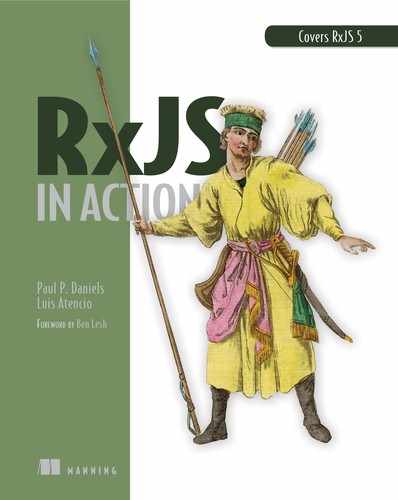| Transforming a sequence |
Delaying or offsetting the entire emission of an event sequence |
delay |
| |
Prepend an element onto the stream |
startWith |
| |
Transform elements one-to-one |
map |
| |
Fold entire event sequence into a single value |
reduce |
| |
Just like reduce, but emit each subsequent fold as an event |
scan |
| |
Extract object properties from emitted data |
pluck |
| |
Buffer a certain amount of data and emit all at once |
bufferCount |
| |
Buffer for a specific period of time and emit all at once |
bufferTime |
| |
Buffer at the pace of when a subordinate observable emits a value |
buffer |
| |
Like buffer, but use a function that creates a new observable to indicate when to close the buffer |
bufferWhen |
| Filtering sequences |
Remove events according to a predicate function |
filter |
| |
Skip a certain number of events |
skip |
| |
Grab the first N number of events |
take |
| |
Emit the values of an observable until a subordinate observable emits; emit events until some other observable tells you not to. |
takeUntil |
| |
Emit only the first event of a sequence |
first |
| |
Emit only the last event of a sequence |
last |
| |
Emit values only after a particular time span given by another observable has passed |
debounce |
| |
Debounce for a fixed period of time |
debounceTime |
| |
Emit event at most once every time period |
throttleTime |
| |
Emit only items that are distinct by comparison (given by you) from the previous item |
distinctUntilChanged |
| |
Like the previous operator, except now you compare the keys of the emitted items |
distinctUntilKeyChanged |
| Utilities |
Perform any sort of necessary side effect such as logging to the screen; useful for debugging purposes |
do |
| |
Embellish the event object with the interval duration span; useful for computing time deltas between emission |
timeInterval |
| Error handling |
Catch an exception produced from any operator and replace it with a continuing observable |
catch |
| |
Allow the sequence to halt and terminate into the observer’s error handlers |
throw |
| |
Retry an operation for a certain amount of time |
retry |
| |
Implement additional logic such as a backoff retry strategy |
retryWhen |
| |
Call function when an observable completes or finishes with errors; good for cleanup tasks |
finally |
| Coordinating sequences |
Combine the latest values from a collection of streams when all of them have emitted; can be used as a static factory operator as well |
combineLatest |
| |
Like the previous operator, except this will emit the latest values from each observable when the source observable emits |
withLatestFrom |
| Joining events of multiple observable sequences |
Forward events from multiple sequences in order of arrival; can be used in static form as well |
merge |
| |
Append the events of one observable sequence after another (in order); can be used in static form as well |
concat |
| |
Cancel a source observable midstream and replace it with a new one |
switch |
| |
Merge a collection of observables using a selector function and emit when all the observable sequences have emitted at a corresponding index; useful for keeping a map of corresponding events. Can be used in static form as well |
zip |
| Projecting or branching other observables, making AJAX requests, DB lookups, and so on |
Merge an observable object into the source observable; flatten the result into a single observable (alias: flatMap) |
mergeMap |
| |
Like mergeMap(), but dispose the source observable when it’s no longer needed (alias: flatMapLatest) |
switchMap |
| |
Project and flatten a source observable but maintain order of events |
concatMap |
| Broadcasting the outcome of an observable sequence to multiple subscribers |
Create a lazy observable that you manage that multiple subscribers can connect to; use it to control when you want to let events flow with connect |
publish |
| |
Create an observable that shares the outcome with multiple subscribers. RxJS manages the lifecycle of this observable internally through refCount. |
share |
| |
Share the last N number of events with all subscribers |
publishReplay |
| |
Share the last observable event with all subscribers |
publishLast |
| Cancel/dispose of the stream |
Unsubscribe from the stream |
unsubscribe() |
